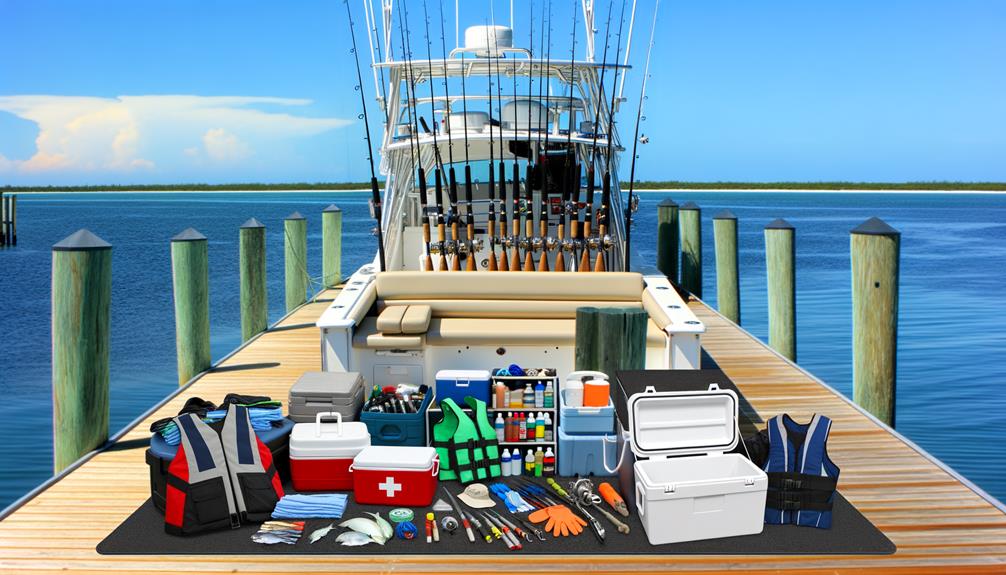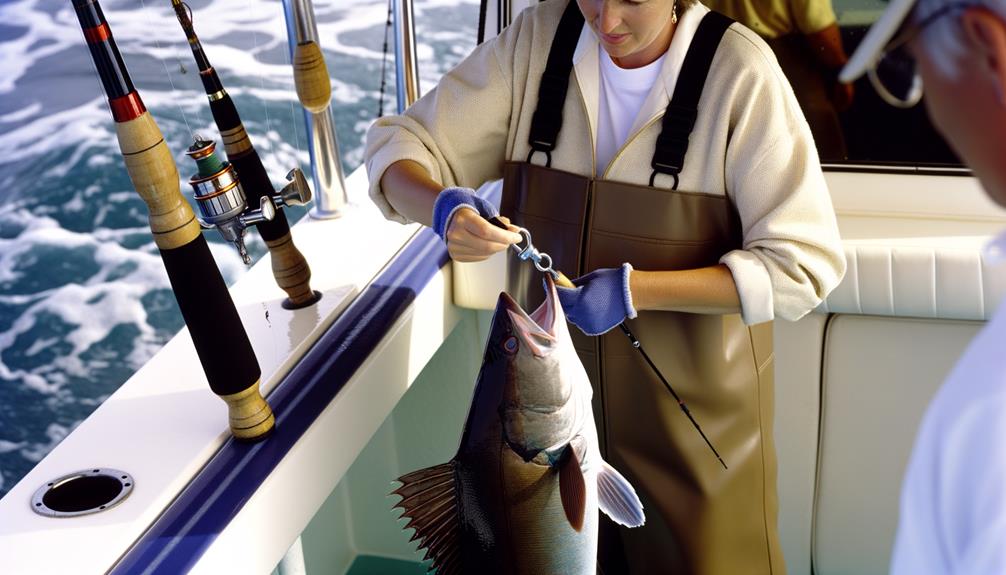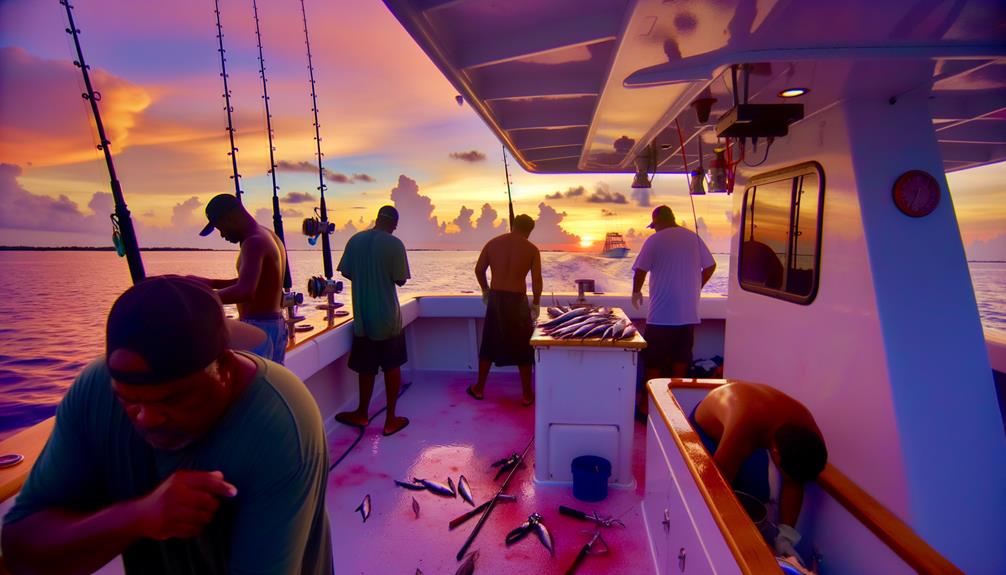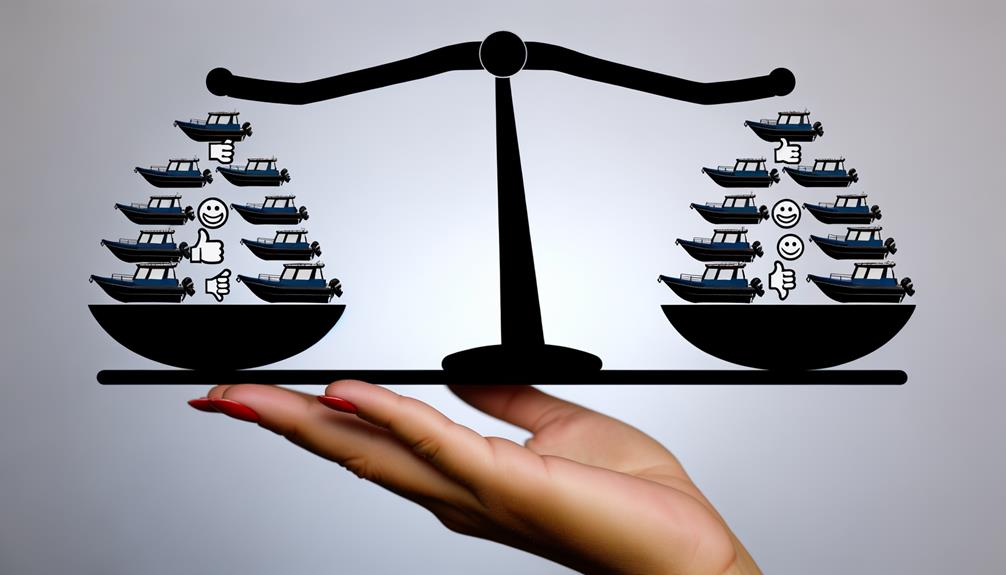Casting a line into the world of fishing charters may seem like you're navigating uncharted waters. You're probably wondering how they operate and what to expect when you sign up for one.
Let's cut to the chase: fishing charters are not just about catching fish, they're about enjoying a unique experience on the water, guided by professionals who know where the fish are biting and how to help you reel them in.
But what does the process look like from start to finish, and what should you consider before hopping on board? We're about to embark on a voyage to explore these questions and more.
Buckle up, you're in for an informative journey.
Key Takeaways
- Fishing charters are guided fishing trips led by experienced captains and guides, providing all necessary gear and equipment.
- It is important to research the reputation of the fishing charter company and choose one that aligns with your preferences and budget.
- Communication with the captain and crew is crucial to establish expectations, discuss preferences, and enhance the fishing experience.
- Upon arrival at the dock, meeting the charter crew, paying attention to safety briefings, and understanding the roles of the crew members are essential for a smooth fishing trip.
Understanding Fishing Charters
To fully appreciate fishing charters, it's important to understand that they're professionally guided fishing trips, led by experienced captains and guides armed with local knowledge and the right gear, designed to provide you with an optimal fishing experience. Your fishing charter company will furnish you with everything needed for an unforgettable day on the water.
The captain and crew of your charter service aren't just knowledgeable; they're also seasoned in the unique demands of the type of fishing you've chosen. Whether it's freshwater, inshore, nearshore, or offshore, their expertise will cater to your preferences, giving you the best shot at a successful outing.
Before your trip, it's crucial to communicate with your captain. Establish your expectations, share your skill level, and discuss your goals. The crew is there to ensure you get the most out of your fishing experience.
Understanding the policies of the fishing charter company, preparing essential items, meeting the crew, and knowing what to do post-trip are all integral parts of your fishing trips. Remember, fishing charters aren't just about catching fish; they're about belonging to a community of anglers who appreciate the art of the sport.
Selecting the Right Charter
Having understood what fishing charters entail, let's now focus on how to choose the right one for your needs. When selecting the right charter, it's crucial to consider several factors to ensure you have the best fishing experience.
- Research: Dig into the reputation of the fishing charter company. The charter company may provide testimonials or reviews, but also check independent sources. Boat owners' credibility and the professional fishing guide's reputation will significantly impact your trip.
- Type of Fishing: Decide on the kind of fishing you want to do. Whether it's inshore, nearshore, offshore, or inland, the choice will determine the suitable charter boat.
- Charter Type: You can opt for a private charter for a personalized experience or a shared charter to save costs and mingle with fellow fishing enthusiasts.
Preparing for Your Trip

Before you embark on your exciting fishing adventure, it's essential to adequately prepare for your trip, ensuring a smooth and enjoyable experience. If this is your first fishing charter, it's crucial to establish clear communication with your captain or guide. Discuss your preferences, expectations, and skill level. Let them know if you have specific fish you want to target or if you're more interested in the thrill of just spending a day on the water.
Packing appropriately is also vital. Bring your fishing equipment, wear rubber-soled sneakers for safety, and consider layered clothing to adapt to changing weather conditions. Confirm details like departure time and location to avoid any last-minute confusion.
Using the Instant Messaging feature, you can conveniently contact your captain, ask for specific directions, and discuss parking information. This ensures that you're well-prepared for your trip. Decide in advance whether you want to keep your catch or practice catch and release.
Meeting the Charter Crew
Upon arrival at the dock, it's crucial to meet the charter crew, understanding their roles, and establish clear communication channels.
It's equally important to attentively listen to the safety briefing provided by the crew to ensure a successful and safe fishing trip.
Understanding Crew Roles
Navigating the world of fishing charters, it's crucial to understand the roles of the crew members, as each plays a unique part in ensuring a successful and enjoyable trip.
Most Fishing Charter companies have a standard crew structure:
- Captain: The captain steers the boat and locates prime fishing spots. They're the authority on onboard policies and safety.
- Guide/First Mate: Assists the captain and educates you on the best fishing techniques and boat and equipment operation.
- Deckhands: These crew members help with baiting hooks, casting lines, and handling your catch.
Understanding these crew roles can significantly enhance your chartered trip.
Always communicate with your crew to ensure a smooth and memorable fishing experience.
Establishing Communication Channels
Having understood the roles of your charter crew, it's equally important to establish clear communication with them before setting sail. Introduce yourself and get acquainted with the fishing guides. Ask questions about their onboard policies and guidelines. If you have any specific requests or preferences for your fishing charter, don't hesitate to share them. Remember, they're here to provide you with the best experience possible.
Discuss your fishing goals and expectations to ensure a customized adventure. Confirm departure times to avoid confusion. Always address any questions or concerns you have, as establishing communication channels with your crew is vital for a successful trip. They're there to make your fishing journey as enjoyable and hassle-free as possible.
Safety Briefing Importance
Before you set sail, it's absolutely crucial to meet the charter crew and attend the safety briefing to familiarize yourself with the boat and understand emergency procedures. This enhances your Charter Fishing experience, making your day on the water both safe and enjoyable.
The safety briefing importance can't be overstated. You will:
- Learn where life jackets, fire extinguishers, and emergency exits are located.
- Understand the boat's rules and designated areas to avoid accidents.
- Establish a rapport with the crew, facilitating easy communication throughout the trip.
Boarding and Departure Process
Now, let's tackle the boarding and departure process.
First, it's crucial to understand the charter's policies, which may include arrival times, safety instructions, and catch-and-release guidelines.
Next, ensure you've completed your pre-departure checklist – this includes meeting the crew, familiarizing yourself with the boat, and confirming your pickup times – to guarantee a seamless start to your fishing adventure.
Understanding Charter Policies
To ensure a smooth and enjoyable fishing charter experience, it's essential to check the specific boarding and departure policies with your captain prior to the trip. Here are three tips to make your private charter outing a success:
- Arrive early: This allows time to meet the crew, familiarize yourself with the boat, and clarify any last-minute details.
- Know the rules: Understanding charter policies means knowing what's allowed onboard and what's not. This includes restrictions on alcohol consumption or smoking, for example.
- Discuss fish handling: Communicate your preferences for keeping or releasing fish. Remember, you're obligated to release fish that aren't of legal size.
Lastly, don't forget to tip the captain and crew. A 15-20% tip is standard for a job well done.
Pre-Departure Checklist
Getting ready for your fishing charter trip requires a thoughtful pre-departure checklist to ensure a smooth and successful experience.
As part of your First Charter, you'll need to:
- Choose a Fishing boat suitable for your needs.
- Consult with your captain before the trip to understand the company's guidelines and departure times.
- Pack essentials like rubber-soled sneakers, layered clothing, and personal items in zip-lock bags.
- Familiarize yourself with the fishing boats and the charter's policies.
- Arriving early at the marina lets you meet the crew and settle in comfortably.
- Open communication with the captain about your fishing goals and preferences is key.
These Fishing Tips and your pre-departure checklist will help you belong to the angling world seamlessly.
Navigating Departure Timing
After meticulously checking off your pre-departure list, it's essential to understand the process of navigating departure timing, which includes both boarding and departure. Here's how fishing charters work.
- Arrive at the marina 15-30 minutes early. This allows time to meet the crew and get familiar with the boat, making you feel part of the trip.
- Confirm the departure time and location the day before. This ensures you're ready for the travel time and a full day of fishing.
- Follow the captain's instructions for a timely departure. Remember, time spent on the boat is precious.
When you're ready to leave the boat, do so in an orderly manner, respecting the crew and other guests. This way, the trip ends as smoothly as it began.
The Fishing Experience
Before embarking on your fishing charter, it's essential to communicate with your guide about your expectations and preferences for the trip. This includes discussing the Types of Fishing you're interested in and the specific fishing targets you have in mind. Remember, fishing charters work to ensure you get the most out of your time spent on the water.
Upon boarding, you'll want to familiarize yourself with the boat. Your guide will help you understand where the necessary equipment is located and how to use it. This is part of the fishing experience, and it's designed to help you catch fish effectively.
Ensure you're adequately dressed for the trip. Rubber-soled sneakers, layered clothing, and sunscreen are essential to ensure your comfort and safety during the trip. After all, to enjoy fishing, you must be comfortable while doing it.
Once the trip concludes, it's customary to tip the crew and express your gratitude. Understanding the cancellation policies is also vital in case future plans change. With good communication and preparation, you're sure to have a memorable fishing experience.
Handling Your Catch

Once you've hooked a fish, it's crucial to know how to handle it, whether you're planning to keep it or release it. Learning the proper catch preparation techniques can make all the difference in preserving the quality and freshness of your fish.
Deciding to keep or release your catch, along with understanding the correct storage methods, are key aspects of the fishing charter experience.
Catch Preparation Techniques
To ensure the quality and taste of your catch, you'll need to follow certain catch preparation techniques from the moment the fish is hooked. When you catch a fish, especially a big fish that could be the fish of your life, it's crucial to handle it properly.
- Bleed the fish properly. After landing the fish, cut its gills to bleed it out. This enhances the quality of the meat.
- Maintain freshness. Keep the catch on ice or in a cooler immediately after catching. This helps to maintain freshness.
- Clean and fillet promptly. Clean the fish as soon as possible to avoid spoilage.
Proper Storage Methods
After you've diligently followed the right catch preparation techniques, it's essential to focus on how you store your catch to maintain its freshness and quality. This is where proper storage methods come into play, whether you're involved in recreational fishing, deep sea fishing, in-shore fishing, offshore fishing, or nearshore fishing.
| Fishing Type | Ice Storage | Packaging |
|---|---|---|
| Recreational Fishing | Essential | Vacuum-Sealed Bags |
| Deep Sea Fishing | Crucial | Airtight Containers |
| In-Shore Fishing | Vital | Vacuum-Sealed Bags |
| Offshore Fishing | Necessary | Airtight Containers |
Release or Keep?
Deciding whether to release or keep your catch is a crucial part of the fishing process. It's important to consider factors such as the specific species' regulations, proper catch-and-release techniques, and the charter's policies.
When on a deep sea fishing adventure, you should first familiarize yourself with the rules regarding the fish species you're after. This is how fishing charters work; they prioritize compliance to promote the best fishing practices.
If you opt for 'catch and release,' ensure you're trained in the least harmful techniques. This choice not only sustains the marine ecosystem but also builds a sense of belonging among ethical anglers.
Lastly, if you decide to keep your catch, inquire about the charter's policies on handling, particularly cleaning and packaging. Remember, fishing includes respecting the waters and its inhabitants.
Post-Trip Procedures

Once you've reeled in your catch, it's crucial to assess whether you'd like to keep or release the fish. This choice is an integral part of the post-trip procedures after you go deep sea fishing. The crew can guide you on the best practices for either option, and they're always happy to share their insights.
Now, say you'd a great time and learned about the fishing process. It's customary for every charter to express gratitude towards the crew. A sincere thanks goes a long way in showing appreciation. In addition, it's common practice to tip the crew, typically 15-20% of the trip cost. This gesture reflects your satisfaction with their service.
If it's your First Time on a fishing charter, it's paramount to familiarize yourself with the cancellation policy. Charter companies have clear guidelines on how to handle cancellations, both from your end and theirs. If unfortunate circumstances lead to your trip getting canceled, don't fret. The company will guide you through the next steps.
Dealing With Cancellations
Navigating through the process of cancellations can seem daunting, but it's less complicated when you fully grasp the cancellation policy of the fishing charter you've booked. Understanding how fishing charters work, including dealing with cancellations, can provide a lot of information and peace of mind.
- Make Sure: Always make sure you fully understand the cancellation policy before booking. This includes knowing what fees or penalties may apply if you need to cancel or reschedule.
- Communication is Key: If a change of plans is necessary, communicate promptly with the charter company. They're there to help, and it's always a good idea to be upfront and honest.
- Pay attention to factors that can affect your trip: Weather, personal unexpected events, or changes in fishing regulations can all lead to cancellations. It's beneficial to have a backup plan in case of a cancellation.
While these steps mightn't cover every situation, they provide a solid foundation to navigate cancellations smoothly. Remember, being informed, understanding policies, and communicating effectively are key aspects to dealing with cancellations effectively.
Pros and Cons of Charters

Weighing the pros and cons of fishing charters can help guide you towards the best fishing experience tailored to your needs and preferences. Fishing is a great way to spend quality time on the boat, exploring the deep waters and catching your favorite fish species.
One of the major pros of charters is that they provide access to the best gear and tackle, ensuring a successful fishing trip. Another advantage is the cost-effectiveness. Charters are less expensive than owning a quality fishing boat, making it a great option for those on a budget. Also, with professional captains and guides who know how fishing charters work, your time on the boat is guaranteed to be a great experience.
On the flip side, there are a few cons to consider. Lack of boat ownership may feel limiting, and you might miss the thrill of spontaneous fishing trips. Charter costs can add up if you're a frequent angler, potentially matching the expense of owning a boat. Lastly, you might find the experience less personalized than having your own boat.
Frequently Asked Questions
Is Charter Fishing Worth the Money?
You're getting value for your money with charter fishing. It's affordable compared to boat ownership, and the amenities, exclusive access, and equipment provided save time. Booking's simple and most customers leave satisfied with the experience.
Why Are Fishing Charters so Expensive?
Ever wondered why fishing charters are so pricey? It's a cost breakdown of charter exclusivity, maintenance expenses, professional guidance, equipment costs, and seasonal rates. You're paying for a top-notch, unique experience. Isn't that worth it?
Who Keeps the Fish on a Charter?
Usually, the catch distribution is decided by charter policies. You'll discuss fish ownership with the crew, considering legal constraints and charter etiquette. It's important to voice any disputes for sustainable practices and resolution.
Do You Tip the Owner of a Fishing Charter?
You don't usually tip fishing charter owners. They're compensated through charter costs. However, showing gratitude for their service quality is a nice gesture. Evaluate your satisfaction and consider tipping if the owner also served as crew.
Conclusion
So, there you have it. You've navigated the high seas of fishing charters, from selecting the perfect vessel to handling your triumphant catch.
Sure, you could have just grabbed a rod and hit the nearest pond, but where's the adventure in that?
Remember, a fishing charter isn't just about the fish—it's about the experience.
So tip your hardworking crew, pat yourself on the back, and start planning your next maritime adventure.
After all, the sea always calls again.
